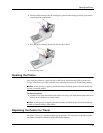
35
Chapter 7
Frequently Asked Questions
This chapter gives answers to some frequently asked questions about working with the DiscPainter
CD/DVD printer.
What kind of discs can I print on with the DiscPainter printer?
You can only print on discs designed for inkjet printers. Do not use thermal discs, which can also
have a white printable surface, or other non inkjet-printable discs.
What will happen if I don’t use an inkjet-printable disc?
Inkjet printable discs are coated with a special material to allow the ink to adhere. If you do not use
discs with this special coating, the ink will pool on the disc surface and not dry.
What are hub-printable discs?
Hub-printable discs allow you to print your design closer to the inner edge of the center hole in the
disc. Refer to "Working with Discs" on page 5 for more information about discs.
What type of discs are recommended for inkjet printing?
We recommend purchasing inkjet-printable discs from any of the major disc manufacturers. Glossy
inkjet or water-resistant inkjet discs give the best quality of inkjet printing.
What is the difference between matte and glossy discs?
Inkjet matte discs have a dull, flat surface. Inkjet glossy discs have a lustrous, shiny surface and are
often described as water-resistant. Matte surfaces, by their design, provide a softened appearance,
while glossy surfaces provide much sharper images.
Where can I find inkjet-printable discs?
You can purchase inkjet-printable discs locally or online from a computer or office supply retailer,
or directly from DYMO at www.dymo.com.
Why does my printed design look different on different discs?
Manufacturers add a special coating to inkjet-printable discs so that the ink can be absorbed into the
coating allowing the ink to adhere to the surface. Different manufacturers develop different
coatings. The differences you see in your printed design are due to the amount and depth that the
ink is absorbed into the surface. Some coatings absorb the ink deeper than others, and this results in
differences in density or brightness of the colors. Matte surfaces, by their design, provide a softened
appearance, while glossy surfaces provide much sharper images.


















